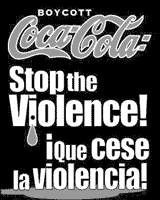Another union leader slain in Colombia
By
Berta Joubert-Ceci
Published Sep 23, 2005 10:04 PM
While one U.S. ally, Colombian President
Álvaro Uribe, was preparing to visit the United States to promote his
“Justice and Peace” Law, another Colombian union leader, the most
recent in the long list of murdered unionists, was savagely and cowardly
assassinated. His murder exposed to the world the gruesome reality behind this
law.
On Sept. 11, people found the body of Luciano Enrique Romero Molina.
He was bound, stabbed 40 times and showed signs of having been tortured. Romero
Molina, 47, was a respected and loved leader of SINALTRAINAL, the union
representing Coca-Cola and Nestlé workers in Colombia.
Romero
Molina was the secretary of the union’s Human Rights department and an
active member of the Committee in Solidarity with Political Prisoners. His and
his union’s concern for human rights was illustrated by his unfailing
Sunday visits to the prisoners in Valledupar jails, where he monitored their
situation while bringing them support and solidarity.
To discourage visits
and communication with prisoners, the government makes a visit to political
prisoners in Colombia extremely difficult and time-consuming. [Joubert-Ceci
recently visited women political prisoners at the Buen Pastor jail in
Bogotá—ed.]
Romero Molina worked 20 years in a Nestlé
company in Valledupar, a department in the north of Colombia bordering
Venezuela, until Oct. 22, 2002, when he was fired for participating in a strike
against the company. In a show of the Colombian government’s disregard for
labor rights, the Ministry of Social Protection had declared the strike
illegal.
Romero Molina then filed a suit in the First Labor Court of
Valledupar Circuit against the companies involved: Nestlé de Colombia
S.A., Cicolac Ltd. and the Dairy Partners Americas Manufacturing Colombia Ltd.
He demanded his reinstatement.
As a result of his labor and human rights
activities he was a target of the paramilitaries who support the interests of
corporations like Nestlé and Coca-Cola.
The death threats he had
received from paramilitaries made him leave Valledupar in several occasions.
Since the end of 2004, he had been staying in Girón, Spain, under a
special protection program and had just returned to Colombia in the beginning of
this year.
When he was assassinated, he was under the
“security” of the Organization of American States’ Human
Rights Inter american Commission program of Pro tec tive Measures. He is
survived by his compañera, Ledys Mendoza, and his four
children.
His body was found in Las Palmas, a sector of the La Nevada
neighborhood known to be under the paramilitaries’ control. A statement
released Sept. 11 by the Foundation Committee in Solidarity with Political
Prisoners of Valledupar (FCSPP) states, “As a consequence of the death
threats against Romero Molina’s life, the FCSPP had asked the Colombian
government that he be included in the protection program for union leaders and
human rights advocates; the only protection given was supplying two units of
mobile phones.”
This is in sharp contrast to Uribe’s process
of “demobilization” of paramilitaries that offers protection and
special programs to paramilitaries who “promise” to leave the
notorious death-squad grouping.
The Law of Justice and Peace simply
furthers the legalization and protection of these groups that have caused
countless murders, massacres, threats, and other numerous despicable crimes
against the Colombian people, especially Afro descen dants, Indigenous, human
rights advocates, labor leaders, and anybody else who opposes Uribe/United
States policies.
Many Colombian and international groups, even those in
the U.S., have denounced and criticized this law. In a letter to Uribe, Leo W.
Gerard, the international president of the Steelworkers’ union (USW)
writes: “I am writing to express my grave concern with the recent,
so-called ‘Law of Justice and Peace’ which you initiated and
recently signed into law.
“This law has been roundly condemned by
the International Metal workers Federation, of which we are a member, and by all
human rights groups reporting on Colombia, including Am nesty International,
Human Rights Watch and the Inter-American Com mis sion of Human Rights. As these
groups report, this new law gives almost absolute impunity to the paramilitaries
in Colombia—groups which have been engaged in gross human rights abuses,
including the murder of hundreds of trade union leaders - while asking for
little in return.”
Romero Molina’s union SINALTRAINAL
denounced the murder and asks the international community to send protest
messages. Edgar Paez, from the National Board of the union, wrote, “We
repudiate this horrendous crime that is part of the endless list of trade
unionists assassinated in Colombia, under the strategy of state terrorism and of
the persecution by the companies to exterminate the union
movement.
“Once more we condemn the government of Álvaro
Uribe Vélez and his false ‘peace process’ with the
paramilitary groups that, as we have seen, continue massacring the unarmed
population, and their crimes will remain in total impunity thanks to the Law of
Justice and Peace”.
Readers can write protest letters to: President
Álvaro Uribe Vélez ([email protected]; [email protected]); Vice President Francisco Santos ([email protected]); Human
Rights Department Director Dr. Carlos Franco ([email protected]);
General Prosecutor Dr. Mario Iguarán Arana ([email protected];
[email protected]); Interamerican Commission for Human Rights
([email protected]) with a copy to: SINALTRAINAL at [email protected].
Articles copyright 1995-2012 Workers World.
Verbatim copying and distribution of this entire article is permitted in any medium without royalty provided this notice is preserved.
Workers World, 55 W. 17 St., NY, NY 10011
Email:
[email protected]
Subscribe
[email protected]
Support independent news
DONATE


